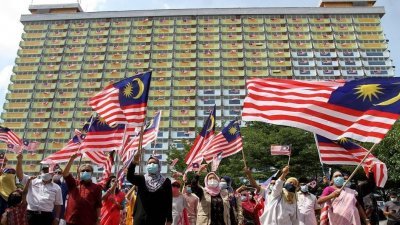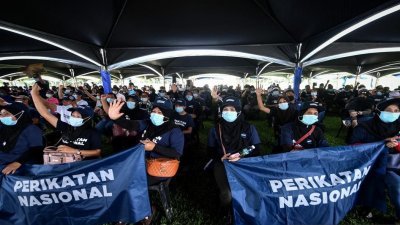最近,国际货币基金组织发布了一份报告,对马来西亚未来的经济和金融状况提出了一些结论。这些结论可以做为团结政府在制定和实施中短期政策的指南。报告指出:
大马2023年经济预计增长4.5%,比2022年逊色。这将受外部因素推动。
增长风险亦来自外部因素,例如全球经济活动放缓。这很可能会因全球主要央行收紧货币政策而加速。
增长不平衡,农业、建筑业和矿业增长还无法恢复到疫情前水平。
2023年通货膨胀预期将维持在3.3%左右,持续补贴应可抑制通膨压力。
马来西亚需关注把债务降低,这可通过重大的财政整顿和开发可持续的中长期收入来达致。
有必要通过收入再分配机制减轻低收入家庭负担和增强国内消费信心。
收紧货币政策以扶持令吉并维持通膨稳定。利率调整必须考虑到对家庭和企业的影响,并确保经济增长避免停滞。
第12大马计划和2023年预算案的推行,须以加强广泛的生产力为驱动、包容性增长、应对气候变化、促进数码经济、加强善治和反腐败措施。
表面上,国际货币基金组织似乎对第12大马计划和2023年预算案“赞赏”。但实际上我们可以看出,该报告是很“客气”的,没有强调国家经济面临著的风险和危机。
国际货币基金组织预设的今年4.5%增长率显然是一个乐观的估计。鉴于马来西亚经济的开放性,其似乎没有考虑全球的发展如何影响我国。最近的美国矽谷银行倒闭、乌克兰战争的持续以及中国(马来西亚最大的贸易伙伴)的增长率下滑,都可能会引发的衰退逆风。这也是为何近日安华对中国进行的官访,毕竟,我们的经济前景与中国越来越紧密相关。
国际货币基金组织的报告虽认可我国在一些领域的改革,但也提出具体建议,如何重启经济的发展。不过,有关的建议主要是依据第12大马计划和2023年预算案中的政策和战略作出的。
谈到第12大马计划,该报告概述了14种改造马来西亚的方案,其中须由转型式领导来监督执行,并动员国家之力,以实现第12大马计划目标──一个繁荣和高收入,可持续的低碳经济,即具有全球竞争力。
然而,第12大马计划与其所追求的目标相去甚远。更没对如何复苏新冠疫情下遭到破坏的经济给予多大关注。反之,第12大马计划选择了一个非常特别的行业赢家,如航空航天业,这政策也意味著多媒体和生物科技的失宠。
臃肿公务员体制
事实上,第12大马计划是复制过去五年计划的模板。第12大马计划不仅强化了现有的官联公司。其还计划创造更多来监督经济的部门。这是错误的转型。我们需要把重点放在私人界,特别是中小企业,让他们有平等的机会、平等的资源和公平的竞争环境。
转型式的领导绝对不可能通过臃肿的公务员制度来实现。臃肿的公务员制度,实际上是一种浪费、低效率和疏漏,也导致公务员薪酬和退休金负担日益庞大,更是政府开支中最大的支出。
但至今政府仍然没有强调把效率、绩效和包容性的价值带进体制。
早在1995年,马来西亚和韩国的生产率指数是相等的。然而,到了2021年,马来西亚落后于韩国近3万美元(13万令吉)。要提高马来西亚的生产力不是没有方法。数码化、循环经济、工业4.0,各有所长。在中小微企业领域尤其如此,这领域雇用了马来西亚40%劳动力,其中大多数企业都面临资金流动问题,甚至不敢梦想采用多媒体(ICT)解决方案和工业4.0。在著眼于提高中小微企业生产力之前,需要创新的解决方案来提高其资金流动性。
有时经济学家会忘记马来西亚经济的多样性。马来西亚的非正规经济领域其实很庞大。因此,国家经济须以两个层面来看待,可是人们一直以来却鲜少关注非正规的经济,甚至遗忘了其存在。
我们应让经济而不是政治来决定和引导国家的发展。但事实并非如此。例如,马来西亚将大学建设视为能力建设的主要手段,可是非正规经济领域需要的是技职教育培训。结果是,政府花费的数万亿令吉的投资和培养大量且不断增长的失业大专生。
我们只能希望国际货币基金组织在其准备的更全面报告中,提出切实的计划,以支持真正的改革,纠正马来西亚经济的问题。最重要的是,政府需要实施一系列涉及财政、劳动力市场、社会安全网、竞争力等方面的改革。我们显然迫切需要采取大胆的改革措施,以免国家陷入如斯里兰卡和其他失败的经济体处境。
林德宜《如何善用国际货币基金组织报告?》原文:How Useful Is The IMF Report Card?
Recently the IMF released a report which provided some conclusions on Malaysia’s economic and financial health going forward. These conclusions can be read as providing guidance to the Unity government for its immediate and medium term policy making and implementation
‧The Malaysian economy is expected to grow 4.5 percent, more modestly than 2022. This will be driven by external factors.
‧The risks to growth will also come from external factors, such as a worldwide slowdown in economic activity. This could be spurred by a tightening of monetary policy by major central banks.
‧Growth is uneven, with agriculture, construction, and mining, lagging behind pre-pandemic levels.
‧Inflation expectations will remain around 3.3 percent during 2023. Continued subsidies should keep inflationary pressures in check.
‧Malaysia needs to focus on debt reduction through major fiscal consolidation, and the development of a sustainable medium to long-term revenue reform.
‧Income redistribution to lower income families through transfers to alleviate poverty and bolster domestic consumer confidence is necessary
‧Monetary policy requires tightening to support the Ringgit and keep inflation grounded. Interest rate adjustments must take into account the wellbeing of households and corporations, in order to maintain growth, and prevent any stalling of the economy.
‧RM 12 and budget 2023 should be rolled out to enhance broad-based productivity drivers, inclusive growth, addressing climate change, promoting the digital economy, enhancing good governance, and anti-corruption measures.
On the surface, the IMF appears to have given the ‘thumbs-up’ to RM 12 and budget 2023. But in fact we can see that the report was polite by under-emphasising the risks and dangers that the nation’s economy faces.
Risks And Dangers
The postulated IMF growth rate for the current year of 4.5 percent is clearly an optimistic estimate. It does not appear to take account of global developments which will impact Malaysia given the open nature of the economy. The recent bank failures, continuing war in Ukraine and a reduction in the growth rate in China - Malaysia’s largest trading partner - auger strong headwinds. The latter explains PM Anwar’s visit to China. Our economic future is increasingly hitched with that of China, for better or worse.
While the IMF report appears to endorse reforms in various areas, the Mission stayed clear of making specific recommendations concerning what is needed to jump start the economy. Thus the text relies on the implementation of policies and strategies contained in RM 12 and budget 2023.
Going back to the 12th Malaysia Plan, the document outlined 14 game changing approaches to transform Malaysia, where the implementation will be overseen by transformational leadership, promising the whole nation will be mobilized to achieve RM12 objectives – a prosperous and high income, a sustainable low carbon economy, that is globally competitive.
However, the reality of the plan was far from what was espoused. Very little focus was given to rehabilitating the devastation of the economy from the MCOs.
The 12th plan selected very specific industry winners, such as the aerospace industry, a policy that led to dismal failures in multi-media and biotechnology.
The reality is that the 12th Malaysia Plan took the template from past five year plans. The 12th Malaysian Plan not only reinforced existing GLCs. It also planned to create more to oversee sections of the economy. This is the wrong transformation. What is required is to put a focus on private sector enterprises, especially the SMEs so that they have equality of opportunity, equal access to resources and a level playing field.
Transformation leadership definitely cannot occur through a bloated civil service. It has already brought wastage, inefficiencies and leakages as well as a huge and still growing emoluments and pension bill that is the largest single item of government operating expenditure.
But there is still no emphasis to bring about efficiency, merit and inclusiveness into the institution.
Back in 1995 Malaysia and Korea were equal in productivity indices. However, in 2021, Malaysia is nearly USD 30 k behind Korea. There can be no one approach to improving Malaysia’s productivity. Digitization, the circular economy, industry 4.0, all have their place. This is especially the case in the MSME sector, which employs 40 percent of Malaysia’s workforce, where most enterprises suffer with liquidity issues and couldn’t even dream of adopting ICT solutions and Industry 4.0. Innovative solutions to improve liquidity are required before one can look at improving productivity.
Sometimes economists forget about the diversity of Malaysia’s economy. Malaysia’s informal sector is large. Thus, the nation must be seen as having a two-tier economy. There has been too little focus upon the informal sector. It has been forgotten about.
Economics not politics should determine and influence the drivers we use. But this has not been the case. For instance, Malaysia embarked upon university building as the prime means of capacity building, where the informal sector required TVET. The result: several trillion ringgit invested and a huge and growing output of unemployable graduates.
One can only hope that the IMP will present tangible plans to support real reforms to correct what is wrong with the Malaysian economy in the fuller report that it is preparing. Above all, the Government will need to implement a whole range of reforms dealing with fiscal programs, labor market, safety net, competitiveness etc. There is a clear urgency for the adoption of bold reform measures lest the country slide into a situation similar as the one engulfing Sri Lanka and other failed economies.
要看最快最熱資訊,請來Follow我們 《東方日報》WhatsApp Channel.


















